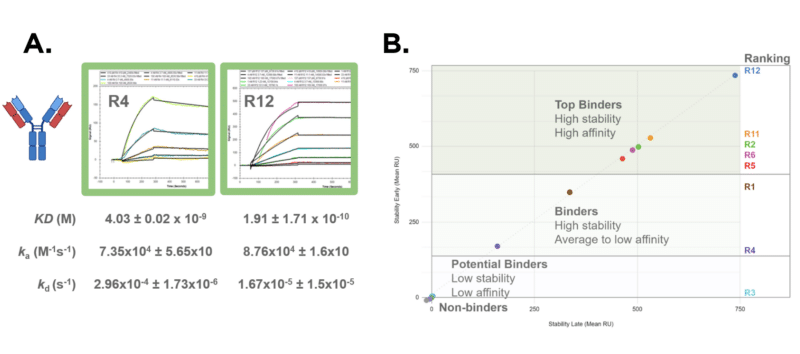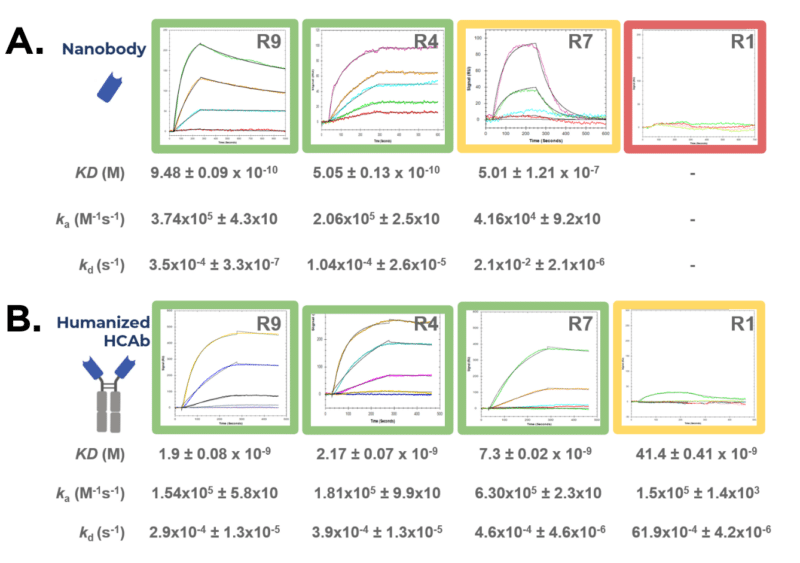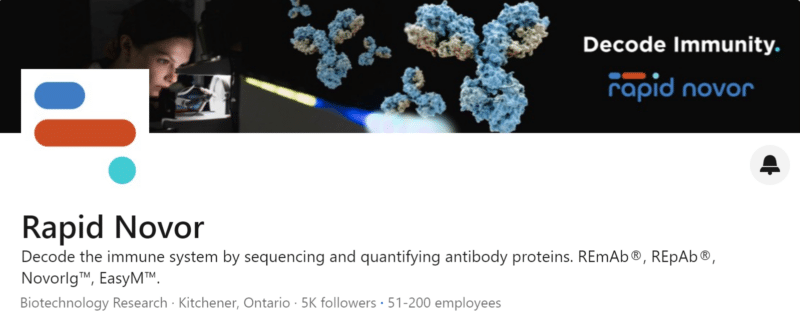Introduction
Antibody affinity is an important attribute in the success of antibody discovery campaigns, as it directly impacts an antibodies efficacy.
REpAb® antibody discovery offers a novel approach that utilizes de novo polyclonal sequencing technology, combining mass spectrometry with advanced machine learning bioinformatics to sequence full-length antibodies directly from the entire circulating antibody repertoire.
This technology sequences antibodies produced from affinity-matured B cells, which have undergone multiple rounds of natural selection to yield not only functional antibodies, but also those with optimal affinity to confer effective immunity in the host.
This raises the question: what range of affinities can be obtained from a REpAb® antibody discovery campaign?
Key Takeaways
- REpAb® antibody discovery sequences antibodies directly from the circulating antibody repertoire, identifying naturally selected and affinity-matured clones.
- REpAb® antibody discovery typically yields antibodies with binding affinities ranging from mid-low nanomolar to picomolar levels.
Antibody Affinities from REpAb Discovery
We present case studies where antibody discovery campaigns employed REpAb polyclonal sequencing to directly sequence full-length antibodies from immunoserum. Selected antibodies were recombinantly expressed and analyzed using surface plasmon resonance (SPR) to assess their association and dissociation rates, as well as their binding affinities.
Antibody Discovery in Human Plasma
In our most recent study, published in Nature Communications in 2024, REpAb was used to de novo sequence neutralizing antibodies directly from the plasma of a SARS-CoV-2-vaccinated patient.
Twelve antibodies were recombinantly expressed and subjected to SPR for kinetic analysis, with six showing equal or superior binding affinities to the original polyclonal antibodies against the Receptor-Binding Domain (RBD) antigen (Figure 1).
- R4 exhibited an order of magnitude faster off-rate, leading to nanomolar affinity.
- R12 showed higher affinity, in the picomolar range, due to a significantly slower off-rate.

Figure 1. Kinetic analysis of human-derived mAbs from the plasma of a SARS-CoV-2-vaccinated patient. A. SPR sensorgrams of two recombinant clones, R4 and R12, with their measured KD, kon, and koff values. B. A complex stability screen assessed the affinity of antibody clones R1-R12 for immobilized RBD, indicating ranking of all recombinantly expressed clones.
Nanobody Discovery in Alpaca
In 2023, REpAb was used to de novo sequence antibodies from immunized alpaca serum targeting a large rabbit IgG antigen. From the polyclonal mixture, ten unique mAb sequences were identified, and four were selected for recombinant expression and SPR kinetic analysis (Figure 2).
In this study, the antibodies were expressed as nanobodies or humanized VHH constructs (humanized HCAb):
- As nanobodies, clones R9 and R4 exhibited high picomolar-range binding affinities, while R7 showed affinities in the nanomolar range.
- As humanized VHH constructs, recombinant clones R9, R4, and R7 displayed nanomolar affinities, whereas R1 had a lower nanomolar affinity, primarily due to an off-rate an order of magnitude faster than that of R4, R7, and R9.

Figure 2. Kinetic analysis of nanobodies and humanized HCAb derived from alpaca immunoserum. A. R9, R4, R7, and R1 recombinantly expressed as nanobodies and subjected to SPR, with their sensorgrams and their measured KD, ka, and kd values. B. SPR analysis with sensorgrams and their measured KD, ka, and kd values for R9, R4, R7, and R1 recombinantly expressed as HCAb.
Factors Influencing Antibody Affinity
No antibody discovery campaign is the same, and as a result, the derived mAbs, their functionality, and binding kinetics are all unique. Many factors influence the antibody affinities derived from REpAb, including:
- Host animal: The species used for immunization influences antibody production. Different species generate antibodies with varying affinities due to immune system differences.
- Immunization protocol: The schedule, use of adjuvants, and timing of doses can affect the immune response, impacting the affinity of the resulting antibodies.
- Antigen: The size, complexity, and specific epitopes of the antigen influence how the immune system generates high-affinity antibodies.
- Purification and enrichment strategies: Methods used to isolate antibodies can impact affinity by selectively concentrating higher-affinity binders and removing lower-affinity variants.
Affinity Alone Doesn’t Tell the Whole Story
While affinity is often emphasized after antibody discovery campaigns, it’s not the only factor that defines performance. Kinetic profiles, including on-rates, off-rates, and overall binding dynamics offer deeper insights into how antibodies interact with their targets. A unique kinetic signature can be crucial for applications requiring fast binding, sustained target engagement, or precise modulation.
Conclusion
Based on over 100 successful client projects and the case studies described here, REpAb antibody discovery typically yields antibodies with binding affinities ranging from mid/low nanomolar to picomolar levels. Notably, 100% of completed REpAb projects have successfully returned mAb binders.
More Information on Antibody Discovery and Kinetic Analysis
Antibody Discovery Services
Mass spectrometry based in vivo antibody discovery platform, that sequences functional antibodies directly from serum or purified protein samples.
Explore Antibody Discovery Services
SPR Kinetic Analysis
Our Surface Plasmon Resonance (SPR) service can determine the on-rate (Kon), off-rate (Koff), dissociation constant (Kd), and affinity (KD) for antibody-antigen interaction.
Explore SPR Services
Talk to Our Scientists.
We Have Sequenced 10,000+ Antibodies and We Are Eager to Help You.
Through next generation protein sequencing, Rapid Novor enables reliable discovery and development of novel reagents, diagnostics, and therapeutics. Thanks to our Next Generation Protein Sequencing and antibody discovery services, researchers have furthered thousands of projects, patented antibody therapeutics, and developed the first recombinant polyclonal antibody diagnostics.
Talk to Our Scientists.
We Have Sequenced 9000+ Antibodies and We Are Eager to Help You.
Through next generation protein sequencing, Rapid Novor enables timely and reliable discovery and development of novel reagents, diagnostics, and therapeutics. Thanks to our Next Generation Protein Sequencing and antibody discovery services, researchers have furthered thousands of projects, patented antibody therapeutics, and ran the first recombinant polyclonal antibody diagnostics

